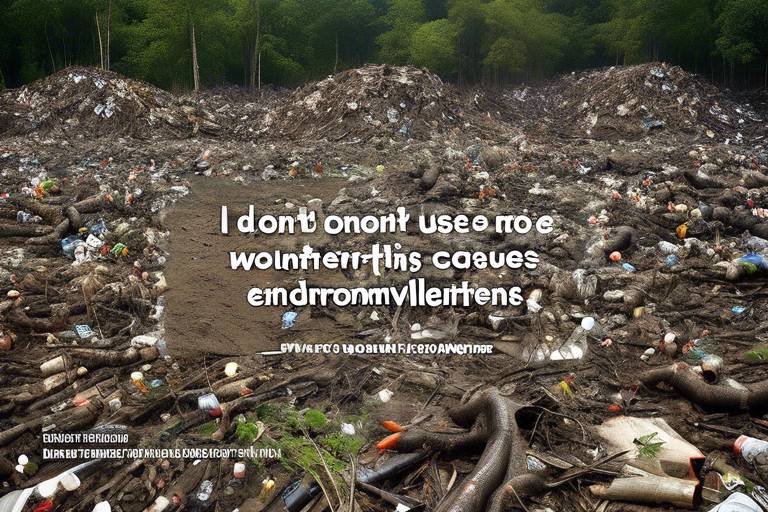The Importance of Environmental Awareness in Schools
Environmental awareness in schools is a vital component of education that goes beyond textbooks and classrooms. By integrating environmental concepts into the curriculum, students are exposed to the importance of sustainability and conservation from a young age. This early exposure helps create a foundation of knowledge and ethical responsibility towards the environment, shaping students into environmentally conscious individuals who understand the impact of their actions on the planet.

Curriculum Integration
Environmental awareness in schools plays a crucial role in educating students about environmental issues, sustainability, and conservation. It helps instill a sense of responsibility towards the environment, fostering a generation of environmentally conscious individuals who can make a positive impact on the world.
Integrating environmental awareness into the curriculum exposes students to environmental concepts from an early age, making it a natural part of their education and encouraging sustainable practices both inside and outside the classroom. By incorporating topics like climate change, biodiversity, and resource conservation into various subjects, students develop a holistic understanding of environmental issues and their interconnectedness with other disciplines. This approach not only enhances academic learning but also cultivates a mindset of environmental stewardship that extends beyond the school environment.

Hands-On Learning
Hands-on learning is a vital component of environmental education in schools. By actively engaging students in practical environmental activities, such as gardening, recycling programs, and nature walks, educators can cultivate a deeper connection between students and the natural world. These hands-on experiences go beyond traditional classroom learning, allowing students to witness firsthand the impact of their actions on the environment.
Through hands-on learning, students not only gain a better understanding of environmental concepts but also develop a sense of responsibility towards the planet. By participating in activities like planting trees, creating compost bins, or cleaning up local parks, students learn the importance of conservation and sustainability in a tangible way. This experiential learning approach fosters a sense of stewardship, empowering students to take meaningful action to protect the environment.

Community Involvement
Community involvement is a vital aspect of promoting environmental awareness in schools. By engaging the school community in various environmental initiatives, such as clean-up campaigns, tree planting events, and recycling programs, students not only contribute to the betterment of the local environment but also develop a sense of ownership and responsibility for their surroundings.
These community activities serve as hands-on learning experiences that go beyond the classroom, allowing students to witness the direct impact of their actions on the environment. It instills a sense of pride in their community and fosters a culture of environmental stewardship among students, teachers, and parents alike.
Moreover, community involvement in environmental projects creates a sense of unity and collaboration within the school community. It brings together individuals from diverse backgrounds and age groups, fostering a sense of shared purpose and camaraderie in working towards a common goal of environmental conservation.

Environmental Clubs
Environmental clubs or groups within schools are more than just extracurricular activities; they serve as platforms for students to come together, share their passion for the environment, and take meaningful action. These clubs create a sense of community and belonging among like-minded individuals, fostering a supportive environment for students to explore and engage in environmental issues.
Through environmental clubs, students have the opportunity to collaborate on projects, organize awareness campaigns, and participate in hands-on activities that promote sustainability and conservation. These experiences not only deepen their understanding of environmental issues but also help develop important leadership skills and a sense of responsibility towards the planet.
By joining an environmental club, students can actively contribute to making a positive impact both within their school community and beyond. They learn the value of teamwork, critical thinking, and problem-solving as they work towards common goals that benefit the environment. Additionally, being part of such a club can inspire creativity and innovation in finding solutions to environmental challenges.

Guest Speakers and Workshops
When it comes to on environmental awareness in schools, the impact can be truly transformative. Imagine a renowned environmental activist walking into a classroom, their passion palpable in every word they speak. The energy in the room crackles with excitement as students hang on to every piece of wisdom shared, their minds expanding with new ideas and perspectives.
These guest speakers bring the real world right to the students' doorstep, breaking down complex environmental issues into digestible pieces. Through their engaging talks and interactive workshops, they ignite a spark within the students, inspiring them to take action and become stewards of the environment. It's like planting a seed of curiosity that grows into a tree of knowledge and activism.
Workshops, on the other hand, offer a more hands-on approach to learning. Picture students gathered around a table, eagerly participating in activities that challenge their creativity and critical thinking skills. Whether it's building a mini compost bin or designing eco-friendly solutions, workshops provide a dynamic space for students to experiment, learn, and innovate.
Moreover, these experiences go beyond the classroom walls. They bridge the gap between theory and practice, showing students that environmental awareness is not just a concept in a textbook but a living, breathing reality that they can actively engage with. Guest speakers and workshops inject a dose of excitement and inspiration into the learning process, turning passive listeners into enthusiastic advocates for a sustainable future.

Green Initiatives
Green initiatives within schools are essential for creating a sustainable environment and instilling eco-friendly practices among students. By implementing various energy conservation measures, schools can significantly reduce their carbon footprint and contribute to a healthier planet. Waste reduction programs play a crucial role in minimizing the amount of waste generated by the school, promoting recycling, composting, and responsible disposal practices.
Furthermore, incorporating sustainable practices such as using eco-friendly materials, promoting water conservation, and reducing single-use plastics can have a lasting impact on the environment. By setting an example through green initiatives, schools not only educate students on the importance of environmental stewardship but also empower them to make conscious choices in their daily lives.

Outdoor Education
Outdoor education is a vital component of environmental awareness in schools, offering students the opportunity to immerse themselves in nature and learn through direct experience. By taking the classroom outdoors, students can engage with the environment in a hands-on way, fostering a deeper connection with the natural world. Outdoor education not only promotes physical activity but also enhances overall well-being by providing a break from traditional indoor learning environments.
Through outdoor education, students can explore ecosystems, observe wildlife, and participate in activities that promote environmental stewardship. By experiencing nature firsthand, students develop a sense of wonder and appreciation for the world around them, leading to a greater understanding of the importance of conservation and sustainability. Outdoor education encourages students to become advocates for the environment, inspiring them to take action to protect and preserve natural resources for future generations.

Partnerships with Environmental Organizations
Collaborating with environmental organizations can significantly enhance the impact of environmental awareness initiatives in schools. By forming partnerships with local or national environmental groups, schools gain access to a wealth of resources, expertise, and opportunities to engage in larger-scale projects that can make a real difference in the community and beyond. These partnerships not only empower students to take meaningful action but also provide them with valuable insights into the complexities of environmental issues and the importance of collective efforts in creating sustainable change.
Frequently Asked Questions
- Why is environmental awareness important in schools?
Environmental awareness in schools is crucial as it educates students about pressing environmental issues, sustainability, and conservation. By instilling a sense of responsibility towards the environment at a young age, students are empowered to make positive contributions to the world.
- How does integrating environmental awareness into the curriculum benefit students?
Integrating environmental awareness into the curriculum exposes students to environmental concepts early on, making it a natural part of their education. This approach encourages sustainable practices both in and out of the classroom, shaping environmentally conscious individuals.
- What role do environmental clubs play in schools?
Environmental clubs provide students with a platform to collaborate, share ideas, and take action on environmental issues. By fostering leadership skills and a sense of camaraderie, these clubs empower students to become advocates for positive change within their communities.
- How can schools engage the community in environmental initiatives?
Schools can involve the community in environmental initiatives through activities like clean-up campaigns and tree planting events. These initiatives not only benefit the local environment but also instill a sense of pride and responsibility in students for their surroundings.
- What are the benefits of outdoor education in promoting environmental awareness?
Utilizing outdoor spaces for environmental education allows students to connect with nature firsthand, fostering a sense of wonder and appreciation for the natural world. This approach also promotes physical activity and overall well-being among students.



















